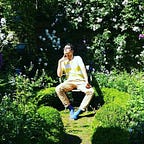Audiences want to have normal conversations about the things we don’t understand, says Bella Boender, editor-in-chief of VPRO’s website and Youtube channels
Bella explains how the Dutch broadcaster is experimenting with web-only formats to talk about politics, sexuality as well as engage with experts. Click here to attend the free Digital Identities seminars for journalists, where she will be speaking. These seminars will take place in Amsterdam, Copenhagen, Oslo and Delhi, and they are powered by Google News Lab.
Bella, please tell us about yourself.
I’m the editor-in-chief of VPRO’s website and YouTube channels. I’m responsible for the editorial vision and I work closely with the social media team. I also lead a multidisciplinary team of journalists, documentary filmmakers and photographers. I guess you could say we’re all evolving by working collaboratively to explore new ideas.
“We’re increasingly looking at web-only formats as part of our offering, which is hard, because it’s tempting to make classic television formats.”
How are you developing VPRO’s online presence?
VPRO has a very strong portfolio in radio and television and I’m trying to achieve the same for our online presence. Our main objective is to make sure our broadcast content is available online. We’re increasingly looking at web-only formats as part of our offering, which is hard, because it’s tempting to make classic television formats. One way to break out of this habit is to invite our audiences online to respond to our content and to use their feedback as inspiration.
Using audience feedback for inspiration? Isn’t that a bit tricky?
Not really, it depends on what you do with the feedback. Let me give you an example. We have a television programme called Tegenlicht, which has been running for fifteen years, in which we feature expert opinions. We noticed that we tend to go to the same people, you could call it the old boys network of experts. In order to create an online offer that complements a traditional format we crowdsourced an alternative list of experts and ended up with 500 names! It’s a pretty diverse list: self-employed people, volunteers and lots of frontline staff from across the country, working in education, culture and championing the environment. We interviewed five of the most interesting people on the list. We’re also making an episode featuring some of them, which will air in April.
So how would you define an expert?
Someone who has brought together different ideas and approaches to rethink fundamental concepts. People who have a broad point of view. I feel such people create new kinds of value. If you refer to our recent video on Geert Wilders’ ideology, we didn’t bring in political experts. Instead, we recorded a conversation between a philosopher and a writer. They have a very different way of looking at politics, and they’re helping us define and trust our own instincts.
How does this approach influence your programme?
Let me give you an example based on a recent project. Heheobros (Hetero Homosexual Brothers) is a web-only series we’ve produced this spring. In each three minute episode, we have two guys, who are friends in real-life, going out for dinner to talk about their relationships. You have these two guys, sincerely trying to understand their differences. The feedback we’ve received is by and large positive. Our audiences tells us that this is a true slice of life. They want more of this — normal conversations about things we don’t understand.
All of this experimentation, what is the ROI?
It’s on several levels. One is just becoming very fluent in the online lingo. The other is not to become too complacent. We cannot be a dinosaur. I think public broadcasters have to try even harder to stay relevant, because there are too many temptations for our audience, and our main objective is to reach audiences. And we need a culture of research. If we’re held accounted for every viewer, we will never experiment. So we’re constantly finding the boundaries between what’s happening in the media landscape in terms of innovation and what as a journalist matters. It’s not just mindless embracing of technologies, but also exploring our role in journalism.
—
Digital Identities powered by Google News Lab is a free programme open to journalists. After a successful pilot in Sweden we’re running seminars in Amsterdam, Copenhagen, Oslo and Delhi this year. Click here to learn more.
